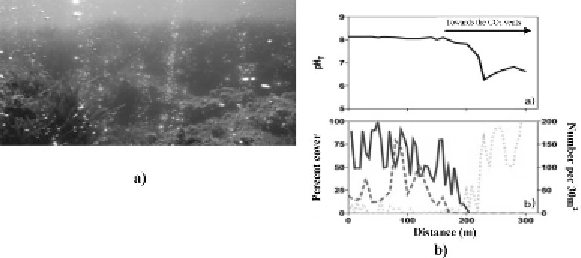Geoscience Reference
In-Depth Information
certain marine plants could be much more sensitive to grazing by fish
and sea urchins despite the stimulation of their photosynthesis.
5.4.1.2.2. Corals and calcareous algae
In contrast to plants and fleshy algae, the response of the primary
production of corals and calcareous algae, which are the first
organisms to have been studied in the context of ocean acidification
[AGE 85, GAT 98], is non-existent or limited, while the effect on
calcification is negative for the vast majority of species studied
[AND 11]. Furthermore, the simultaneous increase of pCO
2
and
temperature generates a larger decrease in calcification than increase
in pCO
2
alone [ANT 08, REY 03]. However, the effect of elevated
CO
2
on calcification is generally less pronounced or non-existent in
temperate corals and in deep-sea corals that exhibit slower growth
[FOR 12, MAI 12, MAI 13, ROD 10]. Net calcification of the
zooxanthellate Mediterranean coral decreases significantly with the
decrease of the pH [ROD 11], and the effect of acidification is clearly
higher when pH decreases concomitantly with an increase in
temperature.
Figure 5.10.
a) Photograph of a Posidonia bed next to a CO
2
vent (Castello
Aragonese, Ischia, Italy; © J. Hall-Spencer). b) Top figure shows changes in pH
along a transect toward CO
2
vents; bottom figure shows along the same transect,
percent cover (left axis) of calcareous (bold line) and non-calcerous algae (dots) as
well as abundance (right axis) of sea urchins (dotted line). Data provided by Hall-
Spencer et al.
[HAL 08] (see color section)


